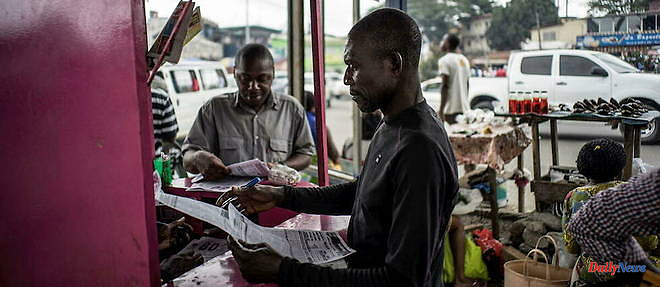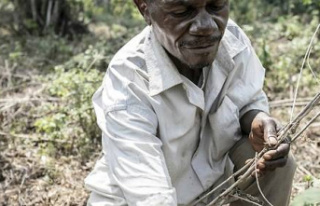“Since 2016, our country has come a long way… Of course, not everything has been perfect. There are still points to improve. In some areas we have not gone as fast and as far as I would have liked. But, it must be recognized, in seven years, the distance covered is immense,” welcomed President Ali Bongo Ondimba. On the occasion of the 55th anniversary of the Gabonese Democratic Party (PDG), on April 2, the president took the opportunity to "take stock" of the past seven years. Begun in a very tense political context after the controversial re-election of the Head of State, Ali Bongo Ondimba's second term was not easy.
Marked by the global health crisis, the country entered a recession in 2020, posting a growth rate of -1.8%. This is well below the figures for 2019, at 3.9%, according to the World Bank. But the implementation, from January 2021, of the 2021-2023 Transformation Acceleration Plan (PAT) has, it seems, borne fruit. According to International Monetary Fund (IMF) projections, Gabon's growth rate is expected to be 2.7% this year and 3.4% in 2023. Sub-Saharan Africa's fourth largest oil producer, and the world's second largest producer of manganese, the country relied, for this recovery, on its extractive industries. In 2021, these resources accounted for 98% of its merchandise exports, says the report entitled "Gabon: Towards Greener and More Inclusive Sustainable Growth", published in December 2022 by the World Bank.
According to Coface, a company specializing in credit insurance, the Gabonese economy has a bright future ahead of it. It will indeed be able to count, next year, on “the dynamics of its secondary activities, like “the construction […] of agriculture [with the development of the exploitation of wood and oil of palm], and the recovery in services". The marketing of carbon credits in the country, which is 88% covered in tropical forests, will also be a source of income. Still according to Coface, the country could draw nearly 291 million dollars.
Under the last mandate of Ali Bongo Ondimba, Gabon therefore withstood the shocks of the pandemic rather well, and more recently, that of the war in Ukraine. But this resistance, driven in large part by the extraction of natural resources, is twofold: while the growth figures are satisfactory, the benefits for the population are still pending. Thus, "despite its economic potential, the country is struggling to translate its wealth of resources into sustainable and inclusive growth", summarizes the World Bank. Over the past five years, Gabon's poverty rate has even increased significantly: from 33.4% in 2017, it rose to 33.9% in 2022. A third of this population of 2.3 million inhabitants therefore lives with less than 5.50 dollars a day, or 3,386 CFA francs. "In Gabon, poverty is ostensibly taking hold, year after year," said economic analyst Mays Mouissi. The country's growth, even positive, remains too weak to benefit Gabonese. To create wealth, double-digit growth would be needed. We are far from it. »
The diversification efforts undertaken over the past seven years, with in particular the creation of Special Economic Zones (SEZ) and the development of the timber sector, have not been enough to alleviate the many ills that paralyze the Gabonese economy. Beyond its heavy dependence on a volatile oil sector, the country suffers from a "lack of redistribution of wealth" and "predation of public money", says Mays Mouissi. According to the United Nations Economic Commission for Africa, each year, Gabon loses between 400 and 500 billion CFA francs due to corruption. A scourge that "harms the country's growth efforts by slowing the emergence of a middle class through the redistribution of profits generated by the state", regrets the institution. In response, the presidency created in 2019 a Ministry of Good Governance, dedicated to the fight against corruption. The government has also set up the National Commission for the Fight against Illicit Enrichment, as well as the National Financial Investigation Agency. But it takes more to restore confidence to Gabonese. In 2021, the country ranked 124th out of 180 in Transparency International's Corruption Perceptions Index.
"The unorthodox management of public funds", said Mays Mouissi, also has repercussions on the initiatives inspired by the government itself to develop the country. One of its main victims is the Emerging Gabon Strategic Plan (PSGE). Set up as soon as Ali Bongo Ondimba took power in 2009, the impact of this vast program running until 2025 is struggling to materialize. “The PSGE, in Gabon, no one talks about it anymore, plagues the analyst. Its goals were ambitious, but mismanagement of its funding prevented it from achieving its goals. »
A situation which, in fact, attracts little investors. In 2019, Gabon was ranked 169 out of 190 in the World Bank's Doing Business ranking, just behind Afghanistan and Burundi. This cruel lack of attractiveness to investors prevents job creation in a country where unemployment has taken root for several years. From 18.5% in 2017, the jobless rate now stands at 22%, according to the International Labor Organization (ILO). "The period 2017-2021 was marked by the highest number of formal job destructions ever observed in the country for 20 years", abounds Mays Mouissi. Thus, between 2017 and 2021, "the number of formal jobs recorded in Gabon increased from 200,329 to 183,608 jobs". In 2020, according to the United Nations, global job losses were over 104,000. Most affected by this situation? Young people aged 15 to 24, whose unemployment rate reached 38.4% in 2021.
However, the government has tried to act. The objective of reducing mass unemployment has even been made a priority by Ali Bongo Ondimba: in 2017, the president pledged to create 10,000 jobs per year, then 30,000 from 2020. In August 2022 , the Head of State again instructed the government to put in place a system aimed at creating 100,000 jobs for self-employed people. The fact remains that a few months before the presidential election, a third of young Gabonese are still unemployed. And this, even though two-thirds of job offers are not filled. "The result, underlines the Gabon report, report on the evaluation of poverty of the World Bank, of a training policy in total mismatch with real employment opportunities. »
Illustration of this state of affairs, in Gabon, almost a quarter of the workforce employed is foreign. “Foreigners work mainly in the service sector and seem to come [to the country] to perform jobs that Gabonese workers refuse to do […] and to compensate for the lack of specific qualifications and skills in the national labor market, explains the report.
"In fifteen years, the job market has evolved a lot, the paradigms have changed. Today, young people no longer necessarily want to pursue a career in the public service like their elders, notes Bonaventure Mvé Ondo, philosopher and professor at the Omar-Bongo University in Libreville. But Gabon has not been able to adapt to this change in mentality, and take the turn of the private sector. He missed that dynamic. For example, the State has not given the necessary means to universities to renew themselves. Higher education in Gabon is, nowadays, in total misery,” he laments. Without job creation, the Gabonese suffer "from a great weariness". “Does this country still make young people dream? I don't think so, blows the philosopher. Today, many want to leave. »












